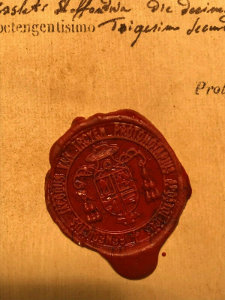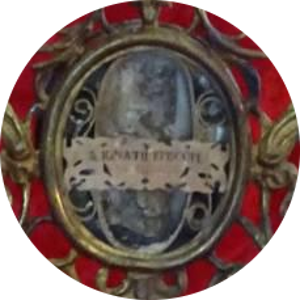"The Healer" & Great Martyr (+303 A.D.)
The Great Martyr, Saint Anastasia of Sirmium the "Deliverer from Potions", also "Anastasia the Healer" was martyred in Sirmium (Sremska Mitrovica, Serbia), and is known by the Greek term the "Pharmakolitria", since she has long been venerated by the church as both a healer and exorcist. She is commemorated by the church December 22.
History
Anastasia was from Rome. She was the daughter of Praepextatus and Fausta and was beautiful in appearance, virtuous and from a wealthy family. Her mother instructed her in the faith of Christ. After her mother's death, she was given in marriage to a pagan named Publius Patricius. He subjected his wife to beatings and would keep her slaved in the house. She endured these torments for a short time since Publius drowned early in their marriage.
As a young widow, she never remarried and secretly dedicated her time to the poor, those in prisons and served their needs daily. She would wash their wounds and especially console them during their anguish.
Having carried out her teacherís request, the saint went from city to city ministering to Christian prisoners. Proficient in the medical arts of the time, she zealously cared for captives far and wide, healing their wounds and relieving their suffering. Because of her labors, St. Anastasia received the name "Deliverer from Potions" (Pharmakolytria), since by her intercessions she healed many from the effects of potions, poisons, and other harmful substances.
Prior to the liturgical reforms of the twentieth century, this martyr enjoyed the distinction, unique in the Roman liturgy, of having a special commemoration in the second Mass on Christmas Day. This daytime Mass was originally celebrated not in honor of the birth of Christ but rather in commemoration of this martyr, and towards the end of the 5th century, her name was also inserted in the Roman Canon. Nevertheless, she is not a Roman saint, for she suffered martyrdom at Sirmium, and was not venerated at Rome until almost the end of the 5th century.
A "Passio" not earlier than the 6th century, gives a legendary account which makes Anastasia a Roman, without, however, claiming that she suffered martyrdom at Rome. The same legend connects her name with that of St. Chrysogonus, likewise in truth not a Roman martyr, but put to death in Aquileia, though the San Crisogono Church in Rome is dedicated to him.
Through her intercessions and prayers, she healed many from the effects of potions, poisons, spells and other harmful substances. This is how she received the honor of Deliverer of Potions. Her deeds and miracles spread throughout the area and her fame brought about her arrest under Diocletian's persecutions. She was tortured and endured many torments and was eventually put to death by fire in the year 290 A.D.
In the fifth century the relics of the saint were transferred to Constantinople, where a church was built and dedicated to her. This was the church where St. Andrew the Fool-for-Christ was brought to be cured from his foolishness, there St. Anastasia appeared to him in a dream and encouraged him to continue his ascetic feat. Later, her head and one of her hands were transferred to the Monastery of St. Anastasia the Pharmokolitria, Chalkidiki of Greece.


Phalange bone relic from her foot preserved at All Saints Shrine and wax seal on Church document.
Hymns
Kontakion in the Second Tone
When they that are found in trials and adversities flee unto thy church O Anastasia, they receive the august and wondrous gifts of divine grace which doth abide in thee; for at all times, O Saint of God, thou pour forth streams of healings for the world.
Kontakion in the Second Tone
Those in temptations and afflictions hasten to your temple, And are restored by the grace that dwells in you,For you ever pour forth healings for all the world, O great Martyr Anastasia!
Troparion in the Fourth Tone
Your lamb Anastasia, calls out to You, O Jesus, in a loud voice:
"I love You, my Bridegroom, and in seeking You I endure suffering. In baptism I was crucified so that I might reign in You, and I died so that I might live with You. Accept me as a pure sacrifice, for I have offered myself in love."
Through her prayers save our souls, since You are merciful.
Troparion in the Fifth Tone
As a martyr you emulated the deeds of the martyrs,
To whom you ministered,
And, striving valiantly, you overcame the enemy.
You are an abundant and overflowing source of grace
For all who come to you, O godly-minded Anastasia!




